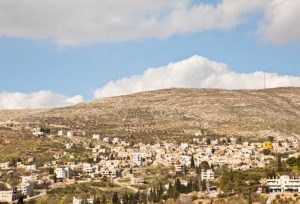
“Wow, your name is so American.”
When you meet someone for the first time, one of the first things they ask you is ‘what is your name?’
For many reasons, that question is extremely significant. It defines how our relationship with that person will play out. Will they remember my name? Does that person even really care, or is that person just being polite?
Perhaps, however, that question is most significant because our names themselves are so significant. They are who we are. With our names, we carry with us our family, our culture and our entire people.
So, when you ask me what my name is, do not tell me that my name is “so American.”
I am جنين. Named after Jenin, Palestine.
Not many people are named after cities. I am, and I am proud.
Jenin is a city in Palestine. It is located in the West Bank region in Palestine, and it is one of the most well-known and respected cities in Palestine.
Part of the reason I am so proud of my name is not just because my parents gave it to me and chose to name me after Palestine, but also because of what Jenin itself represents.
Jenin is home to one of the largest refugee camps in Palestine.
Refugees fled to Jenin in 1948. I do not need to tell you why 1948 is so significant to Palestinians.
Refugees continued to flee to Jenin throughout the decades. Many are from Gaza. Many come from all over Palestine.
All of them were forced to flee their homes. They fled the violence, the bloodshed, and the terror. They came to Jenin.
Jenin is a place where these refugees preserved their culture, and it is a reminder that they exist. That their stories are real, and that they will not be ignored. They survived. They are strong, resilient, and so respected.
Jenin was at the forefront of the Second Intifada. Jenin was surrounded, and Israeli forces tried to destroy it from the inside out. But Jenin survived.
A lot of Palestinian parents named their daughters Jenin in 2002 and the early 2000s.
The refugees, who were forced out of their homes, were the same people who defended Jenin and kept it alive. The Jenins who were born pay homage to that.
They were labeled as terrorists. No one labeled the ones who shot unarmed Palestinian civilians and medical personnel as terrorists.
Today, Jenin and the people of Jenin are still targeted, surveilled, and kept under a watchful eye, more than other Palestinian cities.
When I visited Palestine in 2016, an Israeli official at the border laughed ironically and remarked how shocking it was that a جنينwas able to pass through without any major issues.
So when I meet someone and they ask for my name, well, it is a long story.
It bothers me that when I politely say جنين, they choose to respond with “wow, your name is so American.”
That statement is a way to belittle me.
First, it implies that they were expecting me to be some stereotypical image that they conjured up in their head of what a Muslim woman who wears the hijab is.
Second, it implies that more ethnic sounding names, more Muslim or Arab sounding names, are not American. That to be American, you have to have an English-sounding name.
Finally, it exposes the power dynamics at play. Who gets to decide what is American and what isn’t? Don’t I get a say? I am after all, American. People like to forget that part when they see a young Muslim woman.
What bothers me the most about that statement is that it ignores my history. My people. My people’s history.
America did not save Jenin. America watched young Jenins die on television. Jenin saved itself.
My name is an honor, and I will honor my people. I carry my people and their stories with me.
I am جنين.
جنين—A college student.


I was very moved to read this beautiful and poetic article by Jenin, and thank her for sharing Some of her story and the story of the city of Jenin with us. To learn more about the city of Jenin and its people, i suggest people read Mornings in Jenin by Susan Abulhawa, a remarkable book.
We were just alerted to an event by JVP-Los Angeles on May 1, “Stateless and Abandoned: Personal Stories from Palestinian Women Exiled in Lebanon”, which will allow listeners to hear the experiences and perspectives of four Palestinian women in that situation, different from those in the West Bank, Gaza, Jerusalem—and different from Jenin’s experiences and perspective in the United States. See our calendar for a registration link.